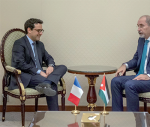You are here
Why some reformist Islamist youth forsake the Muslim Brotherhood in Jordan
Apr 04,2018 - Last updated at Apr 04,2018
Policymakers in Jordan have long been criticised for discounting the political vision of the youth and the type of state they aspire to live in. Young members of Islamist parties are even more marginalised, mostly because of the confrontational relationship their parties often have with the state. It would be foolhardy to ignore the factors that have influenced youth’s changing ideological stance, however, and the implications this may have for the region’s political development.
Jordan has recently witnessed the emergence of two political parties that have splintered from the Muslim Brotherhood (MB). Both have attracted significant numbers of former youth MB members. Understanding why these young people have shifted party alliances provides crucial insight into how the political landscape is changing in Jordan, and how these transformations stand to influence political partnerships and party structures.
The Islamic political scene in Jordan
Islamist youth are young members (18 to 30 years old) of Islamic political parties. In Jordan, these parties comprise the Islamic Action Front, the political party of the Muslim Brotherhood, the National Congress Party, known as Zamzam, the newly established Partnership and Rescue Party (PRP) and Al Wasat Party, which was established in 2001.
Zamzam and PRP emerged on the political scene after internal deliberations, and sometimes public conflicts, within the MB. These conflicts had a profound influence on Islamist youth, along with the developments surrounding the political transitions in Egypt and Tunisia in the early 2000’s, and their experiences during the protests in Jordan in 2012. This consolidated their support for the notion of a civil state, or at least for its foundational principles.
Internal conflict within the MB has traditionally been between reformers and conservatives. Reformers want to strengthen ties with other political actors and have adopted a less confrontational stance towards the government. They have also encouraged new theoretical and ideological approaches to pluralism and the separation of religious and political roles of Islamic movements and parties.
These conflicts became public in 2007 and intensified after attempts for internal reform failed in 2013. As a result, some reformers who launched the Zamzam initiative, which later became a political party, were expelled from the MB. A second group of reformers continued attempts for internal reform, yet later left the MB and established the PRP in 2017. Youth members became caught up in these dynamics. Eager for a new approach that was receptive to fresh ideas, and that eased the tight hierarchy within the MB, many joined Zaman and the PRP.
Political power or
political empowerment?
The rapid rise and fall of the MB in Egypt in 2012-2013 particularly impacted Islamist youth in Jordan, prompting a critical reflection on how political power does not necessarily transcend into political empowerment. Moreover, many perceived the MB’s failure to build horizontal partnerships with other political actors in Egypt as critical in their downfall. They compared this to the success of El Nahda Party in Tunisia, which formed alliences with unlikely leftist and secular actors during the lengthy and complex process of constitutional reform in 2012-2014.
This brought to the fore questions that young Jordanian Islamists had been grappling with, particularly ones concerning political pluralism, political empowerment, and the balance between strict religious stipulations and the pragmatism needed to forge political pathways.
Some participated in the 2011-2012 protests that brought together different political parties and ideologies in Jordan. As one man put it: “It was the first time that we went beyond our closed MB community. I realised that I have more in common with a leftist or nationalist when it comes to my political ideas and concerns than with a Muslim Brother who decided not to join the protests.”
This created pathways for more collective work and party cooperation. Today, despite their disagreements with leftist and nationalist parties over the civil war in Syria, young Islamists still believe that political partnerships and fostering common ground are the best approach for all.
Opponents of Islamic parties tend to dismiss these changes as tactical or theoretical. However, these critics underestimate the crucial role that youth play, and will continue to play, in modifying underlying political dynamics even within political movements like the MB. If we are to properly understand the Jordanian political environment and the prospects for different actors within it, we must take the agency and transformations of the youth political generation seriously.
The writer is an expert in peace studies and conflict transformation with special emphasis on the nexus between Islam, violence and peace building. She contributed this article to The Jordan Times












